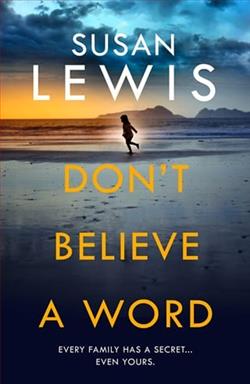Martial Peak Reviews
Susan Lewis's novel, Don't Believe A Word, is a riveting exploration of identity, truth, and the often murky waters of family secrets. With a blurb that promises a gripping tale of mystery and deception, the book delivers on its premise with a narrative that is both engaging and thought-provoking.
The story centers around Sadie, a young woman whose life has been defined by the shadows of her past. Raised by two aunts and with no knowledge of her parents, Sadie is haunted by the belief that she was stolen as a child. This central mystery is the driving force of the novel, propelling Sadie—and the reader—into a labyrinth of secrets and lies.
One of the novel's strengths is its complex character development. Sadie is a compelling protagonist, portrayed with depth and nuance. Her quest for the truth is not just about uncovering her past but also about understanding herself. Her journey is fraught with emotional turmoil, and Lewis does an excellent job of capturing the internal conflict that comes with questioning one's identity. Sadie's vulnerability and determination make her a character that readers can empathize with, even as they question the reliability of her perceptions.
In contrast, the aunts are enigmatic figures, their motivations and actions shrouded in ambiguity. Lewis skillfully crafts these characters, leaving readers to ponder whether they are protectors or perpetrators. This ambiguity adds a layer of tension to the narrative, as the reader is never quite sure whom to trust.
The introduction of Cristy Ward, a podcast host drawn to Sadie's story, adds another dimension to the novel. Cristy represents the modern obsession with true crime and the impact of media on personal narratives. Her involvement in the story raises questions about the ethics of storytelling and the consequences of exposing hidden truths. Through Cristy, Lewis explores the idea that the search for truth can sometimes lead to unintended and dangerous consequences.
Thematically, Don't Believe A Word delves into the nature of truth and the subjective nature of memory. The novel challenges readers to consider how much of our identity is shaped by the stories we are told and the stories we tell ourselves. It raises poignant questions about the reliability of memory and the ways in which our past can be manipulated or obscured by those around us.
Lewis's writing is both evocative and suspenseful, drawing readers into the mystery with a deft hand. The pacing is well-executed, with the tension building steadily as Sadie uncovers more about her past. The narrative is peppered with twists and turns that keep readers on their toes, ensuring that the story remains unpredictable until the very end.
Comparatively, Don't Believe A Word shares thematic similarities with other psychological thrillers such as Gillian Flynn's Gone Girl and Paula Hawkins's The Girl on the Train. Like these novels, Lewis's book delves into the complexities of human relationships and the dark secrets that can lie beneath the surface. However, Lewis distinguishes her work with a focus on familial bonds and the unique dynamics of a family shrouded in mystery.
Overall, Don't Believe A Word is a compelling read that will appeal to fans of psychological thrillers and mystery novels. Susan Lewis has crafted a story that is both a page-turner and a thoughtful exploration of identity and truth. The novel's impact lies in its ability to keep readers questioning the nature of reality and the stories we choose to believe.
For those who enjoy a good mystery with well-developed characters and a plot that keeps you guessing, Don't Believe A Word is a must-read. It is a testament to Lewis's skill as a storyteller that she can weave such a complex and engaging narrative, leaving readers both satisfied and contemplative.
























Reviews 0
Post a Reviews: